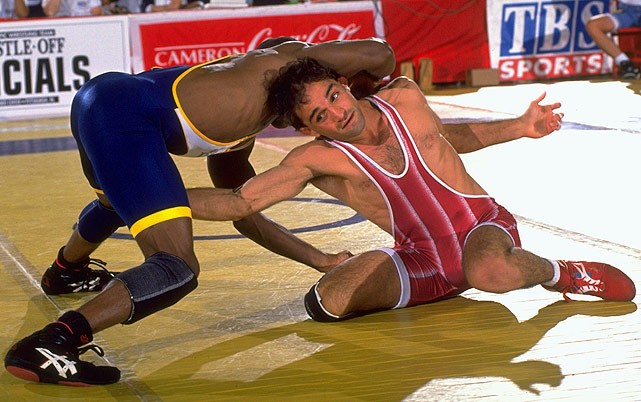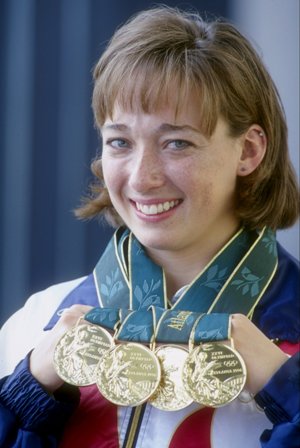We all have memories of Olympic
moments watched on television, and we all know the names and accomplishments of
certain legends from the past. Nevertheless, with so many events and such a
wide a disparity in coverage, many great Olympians slip from the national
memory with the passage of time and many others don’t get the attention they
deserve in the first place. So while this year’s summer games unfold, here, in
alphabetical order, is a reminder of five of our nation’s greatest Summer
Olympians who are in those categories.
Bob Mathias
It’s hard to believe that a
two-time decathlon gold medalist who went on to serve four terms in Congress
could simply vanish in the mist of time, but that seems to have happened to Bob
Mathias.
Within living memory I can recall
when his name was commonly known; when no conversation about great Olympians
could take place without his name being brought up; when nobody could refer to
Bruce Jenner as America ’s
best decathlete because everyone knew that title belonged to Mathias. However, it
has been years since I last heard him mentioned either in public or private.

The decathlon is widely
considered the event which determines the world’s best athlete, and it has long
been one of the Olympics’ premier spectacles. Mathias won it in 1948 and 1952,
and to this day is the only person ever to win it more than once. This accomplishment
is even more impressive when you consider that 1948 was the first year he
started doing the decathlon, and that his margin of victory in 1952 was a
staggering 912 points.
On an interesting side note, at
the same time Mathias was making headlines as a decathlete, he played fullback
for Stanford and led them to the 1952 Rose Bowl, becoming the only person ever
to compete in the Olympics and Rose Bowl during the same year.
Billy Mills
Now 74, Mills is an Oglala Sioux
who became an orphan at the age of 12 and was raised by his grandmother on South Dakota ’s Pine
Ridge Indian Reservation. From that humble beginning, he earned an athletic
scholarship to Kansas
University
Mills competed in the
10,000-meter run and was not even among the favorites. Australian Ron Clarke
held the world record and was heavily favored to win, while the only people
expected to challenge him were the Soviet Union’s Pyotr Bolotnikov and New Zealand ’s
Murray Halberg. When the day came, however, it was Mills who left his mark on
the Tokyo
track.
Entering the final backstretch of
the nearly half-hour race, he was in third place and boxed in behind Clarke and
Mohammed Gammoudi of Tunisia .
Unable to make any move on the more advantageous inside lanes, he bounced
outside, to lane three, and sprinted for the finish line with laser-like focus.
He passed both Clarke and Gammoudi and broke the tape in an Olympic-record time
of 28:24.4.

Mills is the only American in
the 116-year history of the Olympics to ever win the 10,000 meters, and his story
was riveting enough for Hollywood .
The 1983 movie Running Brave,
starring Robby Benson, was about him and rekindled interest leading up to the
Los Angeles Olympics. Maybe it is time for a re-release…
John Smith
During the Cold War, Eastern
European Communist regimes ran orchestrated steroid programs to boost their
countries’ medal counts and project an image of ethnic supremacy.
Unsurprisingly, they seemed to own the wrestling events and it was considered a
given that sports on the mat would be won by Soviets, Romanians, Bulgarians, etc.
The thought of an American wrestler winning gold didn’t feel realistic.
Then John Smith arrived on the
scene. An Oklahoma native who had won NCAA
championships at Oklahoma
State USSR ’s
Stepan Sarkisyan by a score of 4-0. In the 1992 Barcelona Olympics, he won gold
again by defeating Iran ’s
Asgari Mohamadian.
With four world championships to
his name in addition to his Olympic golds, Smith is thought of in wrestling
circles as the best in American history, perhaps even the best in world
history. He returned to Oklahoma
State

Amy Van Dyken
You would think the American
woman with the most swimming gold medals in Olympic history, and also the most
gold medals in a single Olympics, would be widely recognized for years after
her achievements. Oddly, you would be wrong.
Maybe it’s because Amy Van Dyken
comes not from the usual swimming hotbeds of California
and Florida , but from land-locked Colorado . Maybe it’s
because she doesn’t possess the expected look of a swimmer, whatever that
means. But regardless of the reason, there should be no doubt that she is one
of the most accomplished female athletes in American history.

Van Dyken won four gold medals in
the 1996 Atlanta Olympics -- the same number that Janet Evans won during her
entire career -- yet Evans, who did not win a single medal in those games, continued
to receive the lion’s share of media coverage during them. Van Dyken suffered
numerous injuries between those games and the ones in Sydney in 2000, yet she still managed to earn
a pair of golds in the latter. Her six career golds are the most ever won by an
American woman in any sport, in either the summer or winter games.
John Woodruff
If everything else was equal,
John Woodruff would be remembered as one of the most significant Olympic heroes
in American history. But everything else is not equal, because he happened to
make his appearance the same year as Jesse Owens.
The 1936 Berlin
games are remembered as the ones in which Adolf Hitler expected German athletes
to dominate and confirm his vision of Aryan superiority -- only to see that
vision shattered when Germany ’s
best were repeatedly beaten by Owens, who was not only an American but a black American to boot.
As rightful as Owens’s place in
history is, he was neither the only black American nor the first black American
to win gold in Berlin .
Woodruff struck gold first, so it was he who originally got under Hitler’s skin
and caused butterflies to unsettle der Fuhrer’s stomach. A freshman from the
University of Pittsburgh when those Olympics took place, he came from behind to
win the 800-meter run in what was considered one of the most exciting races
ever staged.
Trapped on the inside by other
runners on the first lap, he later remarked, “I knew that the rules of running
said if I tried to break out of a trap and fouled someone, I would be
disqualified…but I had to do something.” What he chose to do was very unusual
for a runner, especially in a relatively short race: He stopped and let
everyone get ahead of him, then started running again in the hope of passing
the entire field. Incredibly, it worked, and as described by the New York Times,
“with his stride of almost 10 feet, Woodruff ran around everyone else. He took
the lead, lost it on the backstretch, but regained it on the final turn and won
the gold medal.”

He passed away in 2007 at the age
of 92, having been the last living member of that supreme group of athletes who
upstaged the Nazis in their own back yard. It’s a shame that Woodruff’s passing
did not receive greater attention in the press.


No comments:
Post a Comment